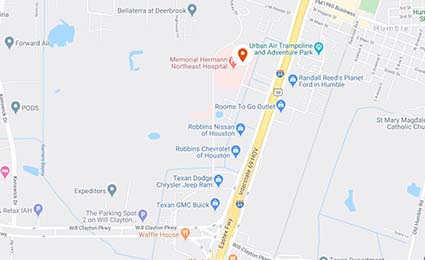Cerebral Palsy and Spasticity
What is cerebral palsy?
Cerebral palsy (CP) is a movement and posture disorder caused by brain damage that occurs before, during, or after birth. The damage makes patients unable to control the amount of flexibility their muscles should have. The condition cannot be reversed and produces a lifelong disability predominantly characterized by muscles being too tense, or spastic. About 1 in 500 children have the neurological disorder. UTHealth Neurosciences doctors have the expertise to help your family manage cerebral palsy symptoms as your child grows and develops.
Causes of cerebral palsy
The brain injury that can trigger cerebral palsy can occur anytime from conception until about the third year of life. In many cases, the exact cause is unknown. Top risk factors include premature birth, low birth weight, brain trauma, or substance abuse by the mother during pregnancy. Certain viruses and infections during pregnancy, such as chicken pox, rubella, toxoplasmosis, and urinary tract infections, also are linked to the disorder. In these cases, the mother’s body may produce proteins that harm the child’s developing brain. A traumatic birth during which airflow is restricted can also put a baby at higher risk of developing cerebral palsy.
Signs of cerebral palsy
Babies with cerebral palsy are often late to reach their milestones, such as lifting their head and rolling over. Signs of spasticity aren’t always immediately apparent but develop over time. Doctors watch for a pattern of symptoms that emerges, and most diagnoses come between the ages of 1 and 3. Children with cerebral palsy typically have weakness in one or more limb, stand and walk on tiptoe, and have difficulty performing fine motor skills. They may have difficulty with balance and may drag one leg. A child may also have poor head control and rigidity throughout their muscles.
Additional issues may include scoliosis, osteopenia, seizures, and vision, speech, and hearing difficulties. Children with CP may have behavioral and intellectual problems. They might also struggle to gain weight.
Diagnosis
The routine screenings conducted at well visits with your pediatrician may flag developmental delays. To further evaluate these delays, the doctor will examine your child’s reflexes, posture, motor skills, and muscle tone. Because many children with cerebral palsy also have intellectual disability or other delays, a pediatric neurologist should evaluate the child thoroughly. Feeding studies and a gait analysis might also be used. A cranial ultrasound can be conducted to get a quick image of the brain, and an MRI or CT scan can provide a more detailed image. An EEG may also be used to check electrical activity in the brain. Metabolic and genetic tests may also be conducted to learn as much as possible about your child’s condition. The results will help your team at UTHealth Neurosciences provide the most comprehensive treatment plan.
Treatment
Medications and injections may be effective to treat pain, lessen muscle tightness, and manage complications related to spasticity. Orthopedic surgery may be an option to improve range of motion. In some cases, surgeons may use selective dorsal rhizotomy to cut the nerves serving the spastic muscles. These types of surgeries can create other long-term issues, and your medical team at UTHealth Neurosciences will discuss the pros and cons with you. Your child might benefit from speech, occupational, or physical therapy. Braces and splints may also be used.
What You Can Expect at UTHealth Neurosciences
Our dedicated team uses advanced technology to accurately diagnose and treat neurological diseases and conditions impacting babies and children. We work in multidisciplinary teams of specialists and pediatric neurosurgeons who share insights, leading to better treatment decision-making and outcomes, as well as lower costs and time savings. Throughout treatment, we will work closely with the doctor who referred your family to ensure a smooth transition back to your child’s regular care. While your family is with us, they will receive expert care, excellent communication, and genuine compassion.
Learn more about the Texas Comprehensive Spasticity Center »
Contact Us
At UTHealth Neurosciences, we offer patients access to specialized neurological care at clinics across the greater Houston area. To ask us a question, schedule an appointment, or learn more about us, please click below to send us a message. In the event of an emergency, call 911 or go to the nearest Emergency Room.











